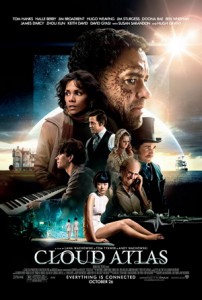Review: Andy Hofmann Discusses “Cloud Atlas”
 Cloud Atlas is the tale of Adam Ewing, an 1850 lawyer from San Francisco on his journey back from the South Pacific. Mr. Ewing is suffering from a parasitic worm, and, as he is treated by his doctor, Henry Goose, his health begins to decline…
Cloud Atlas is the tale of Adam Ewing, an 1850 lawyer from San Francisco on his journey back from the South Pacific. Mr. Ewing is suffering from a parasitic worm, and, as he is treated by his doctor, Henry Goose, his health begins to decline…
In reality, however, Cloud Atlas is really about Luisa Rey, a journalist living 1970’s California. When she meets Rufus Sixsmith, a scientist working at a local nuclear power plant, a dark corporate plot begins to unfold…
No, wait. I got it this time. Cloud Atlas is about Somni~451, a genetically-engineered serving-slave at a fast food restaurant in the distant future. Eventually, she begins developing her own identity, and, through a series of events, begins to embark on a journey of self-discovery, love, and rebellion against her government…
Ok, no, actually…
Silly introductions aside, Cloud Atlas, the film written and directed by Tom Tykwer and Andy and Lana Wachowski, is based off of Cloud Atlas, the 2004 book written by David Mitchell. Consisting of six stories–including those of Adam Ewing, Luisa Rey, and Somni~451–spread across different time periods and locations, Cloud Atlas (the book specifically, but this also applies to the film) is a sprawling work of fiction dealing with themes of life, death, reincarnation, and the way past generations influence the future.
Needless to say, the film adaptation was quite the doozy to create. Before it was actually written, funded, produced and made into a 3-hour filmic epic, most people, including the author of the original book himself, thought the whole thing would be unfilmable. Cloud Atlas is essentially six movies in one.
And we’re finally getting to the point, here: the fact that Cloud Atlas exists at all is an
impressive feat. Sporting a massive 102-Million-Dollar budget and an all star cast of Tom Hanks, Halle Berry, and Hugo Weaving, among others, the one-of-a-kind film is of unprecedented scope and scale. With all its clout, the whole thing comes across as capital-e Epic, something profoundly large and wildly ambitious, so filled to the brim it seems like it could burst at any moment.
This does not, however, necessarily mean you will like Cloud Atlas. Fittingly, it’s a sort of love-it-or-hate-it affair, some critics praising it, others panning it outright. Some found it enthralling, other found it unsatisfactory or boring.
As for me? I enjoyed it– Cloud Atlas understands how to balance its storylines, how to propel itself ever-forward with narrative. I liked the way actors changed makeup and narrative roles across storylines–sometimes heroes, sometimes villains, sometimes old, sometimes young, sometimes a different gender or race entirely–and I was entertained by the ways these changes changed the dynamic, pacing, and tone of the various stories.
Cloud Atlas manages to be a heart-thumping love poem to the power of the individual–of his or her ability to overcome oppression and convention in all its forms if they simply just try. It writes sonnets to the idea of love, romances played over and over over each character’s “reincarnations”–and that, too, is a theme coursing through Cloud Atlas’s veins.
Connected by several singular threads of narrative (letters, a book, a film, etc.), the only other implication of the larger interconnectedness of the six stories is a certain sense that these are the same lives being played out, growing and changing and living anew. These themes are interesting, exciting, and uplifting–but I’m a sucker for such a passionate and intense view of the world.
Yet, Cloud Atlas is not the megablockbuster art-film it purports to be. For all its presentation, beauty, and insane premise, the film, in a lot of ways, plays like a fairly decent “normal” film–you’ll be engaged, interested, wrapped up in the stakes of the characters, but you aren’t going to walk out of Cloud Atlas thinking thoughts that are all that big. You’ll be entertained, quite decently, in fact, but it certainly isn’t a Citizen Kane or a 2001: A Space Odyssey– and, honestly, that’s a massive disappointment–Cloud Atlas obviously wants to be a piece of filmic Literature, and in this striving, collapses under the weight of its narratives and its ultimately simple and fluffy messages.
In the film’s focus upon the nature of the human narrative, trumpeting itself as a touching examination of human lives, Cloud Atlas ultimately fails to say anything interesting about humanity, falling back on a couple of stereotypical platitudes and empty sentimentality.
If you were hoping that the film was going to a sparkling masterpiece, you might want to reevaluate your position. Sometimes, to be honest, the film is filled with a sort of deluded self-importance, so infatuated with the idea of being a piece of revelatory film, that it suffers from an extremely unfortunate twinge of pretentiousness.
If you want a decent high-concept drama spanning multiple interrelated stories, one full of compelling action, romance and sentimentality, one that hooks, engages, and pulls you in with a great degree of conceptual thought, a story deeply themed in multifaceted styles, yet falls short when it comes to message and meaning, a high-rolling piece of aesthetics with no meat, then great. If that meat is central to your experience, however, and you can’t stand an admittedly shallow experience, then–and I’ll put this bluntly–just go read the book.


